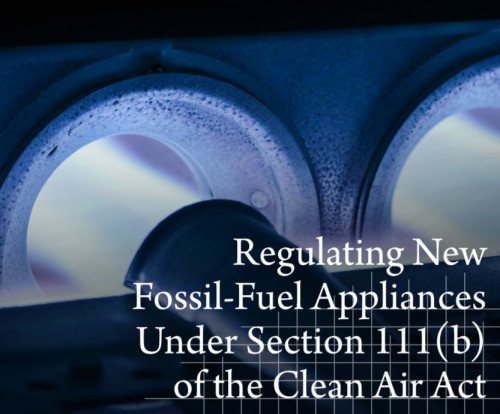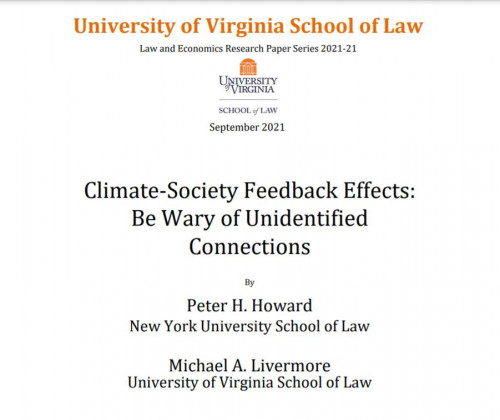-
Comments to US Postal Service on Delivery Vehicle Acquisitions
The U.S. Postal Service committed to acquiring at least 10% battery electric vehicles (BEVs) over the next decade. We filed comments supporting that decision for monetizing the social cost of the project's marginal greenhouse gas emissions and describing several ways the Postal Service should extend its analysis.
-
Regulating New Fossil-Fuel Appliances Under Section 111(b) of the Clean Air Act
This report finds that EPA has authority under Section 111(b) of the Clean Air Act to set nationwide performance standards for new residential and commercial fossil-fuel appliances and that multiple means of reducing emissions from such appliances are adequately demonstrated, including the use of electric-heat-pump technology.
-
Shaping Virginia’s Energy Storage
Virginia recently adopted aggressive decarbonization legislation, which recognized that energy storage has an important role to play in decarbonizing the power sector. The Virginia Energy Storage Task Force (VESTF) was convened to help guide the deployment of energy storage resources. Senior Attorney Justin Gundlach served on the task force, and VESTF's final report drew extensively on Policy Integrity's research, including its reports on energy storage policy, valuing DERs, and DERs' emissions reduction potential.
-
Comments to FERC on Climate Risks, Reliability, and Resilience
The Federal Energy Regulatory Commission requested responses to a number of questions on the effects of climate change and electric system reliability. In April 2021, we submitted comments highlighting opportunities to improve reliability and resilience by adjusting approaches the Commission and others take to planning, investing in, and operating grid components.
Then FERC, following a technical conference over the summer, requested further comments on a specific series of questions. In September 2021, we submitted joint comments describing process options and resources for conducting climate resilience planning, and emphasized how accounting for climate impacts is relevant to consumer costs.
-
Comments to EPA on New Clean Car Standards
We submitted comments on the Environmental Protection Agency’s (“EPA”) notice of proposed rulemaking, Revised 2023 and Later Model Year Light-Duty Vehicle Greenhouse Gas Emissions Standards. Our comment urged EPA to: select the regulatory alternative that will maximize net social welfare and promote distributional justice; rely on legislative and regulatory history to help justify its aproach to lead time; and improve its modeling to more fully capture benefits of stronger standards.
We also submitted joint comments with a coalition of other environmental groups on EPA's use of the social cost of carbon (SCC) in its proposed regulation, recommending that the agency expand its justification its discount rates and inclusion of global damages in the SCC, and affirm that the SCC is a lower bound of projected climate impacts.
-
Comments to NHTSA on Rescinding CAFE Penalties Interim Final Rule
The National Highway Traffic Safety Administration ("NHTSA") sets corporate average fuel economy ("CAFE") standards for light-duty vehicles, and penalizes automobile manufacturers who fail to meet applicable standards. In January 2021, NHTSA issued an Interim Final Rule repealing the inflation-adjusted penalty increase for Model Years 2019-2021, which we commented was untimely and disregarded critical environmental harms.
In August 2021, NHTSA proposed to rescind the Interim Final Rule. We filed comments supporting the proposal for complying with inflation-adjustment obligations, driving fuel savings, and reducing pollution.
-
Comments to FERC on Alberta Xpress Project
We filed a comment letter with the Federal Energy Regulatory Commission (FERC) regarding their continued failures to meaningfully assess the climate impacts of natural gas infrastructure projects, this time regarding the Alberta Xpress Project DEIS. The project will contribute up to 3.31 million metric tons of carbon dioxide equivalent per year in operational and downstream emissions, and it could cause at least $3.33 billion in climate costs over the twenty-one-year precedent agreement underlying it.
-
Testimony in Michigan’s Line 5 Case
Policy Integrity's Economics Director Peter Howard joined climate scientists and economic experts in written testimony to the Michigan Public Service Commission (MPSC) about the significance of excessive greenhouse gas emissions that would be generated if Enbridge’s Line 5 tunnel siting permit is approved. Howard explained that “the Proposed Project will generate a present value of $41 billion (in 2020 dollars) or more in net monetized climate costs from 2027 to 2070 as compared to the no-action alternative – in other words, the Proposed Project will generate average annual monetized climate costs of approximately $1 billion each year over this period, plus significant unmonetized climate effects and other unquantified pollution costs to human health and the environment.”
-
Comments to FERC on Evangeline Pass Expansion Project
We filed a comment letter with the Federal Energy Regulatory Commission (FERC) regarding their continued failures to meaningfully assess the climate impacts of natural gas infrastructure projects, this time regarding the Evangeline Pass Expansion Project EIS. Two companies have requested authorization to construct and operate a new pipeline, compressor stations and meter stations in Louisiana and Mississippi, which will be used to transport up to 1,100,000 dekatherms per day to an LNG facility for export. -
Climate-Society Feedback Effects
Be Wary of Unidentified Connections
To ensure policies are based on accurate predictions of climate impacts, it is critical to understand social-ecological system (SES) feedbacks, including how humans change the climate by reacting to a changing climate. Building on recent scholarly work on the topic, this article describes SES interactions and how they can be incorporated into climate policy tools such as the social cost of carbon. The article then proposes a research agenda for the identification, quantification, and integration of climate-society feedbacks into social-cost integrated assessment models (SC-IAMs).
Viewing recent projects in Climate and Energy Policy






